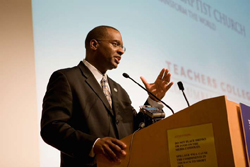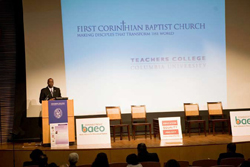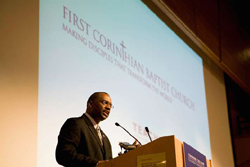Closing the Gap Takes Faith
A conference at TC marshals the faith-based community to address the nation's education crisis
“As a former elected official, I’ve learned that government can’t do everything and doesn’t have all the answers. So even if Congress passes the revised Elementary and Secondary Education Act and makes sure that the $100 billion it contains is spent wisely, that won’t be enough to close our nation’s achievement gap. Washington
The keynote speaker was Peter Groff, Director of the U.S. Department of Education’s Center for Faith-Based and Neighborhood Partnerships. Speaking in TC’s Cowin Conference Center on Saturday, March 27th, Groff—former president of Colorado’s state legislature—was addressing an audience of representatives from primarily church-affiliated organizations and education policymakers who had gathered for “Write the Vision: Make it Clear,” a day-long conference on the role of the faith-based community in closing the education achievement gap.
In conjunction with TC’s Vice President’s Office for Diversity and Community Affairs and the College’s Black Student Network, the event was presented by the First Corinthian Baptist Church Transformers Education Ministry—leaders Reverend Tory Liferidge, Marcus Hall, Ashlei Stevens, Laurinda Rainey, and James Alford. The conference drew a wide audience with over 200 participants from the nearby Harlem community, the Greater New York City area, Connecticut , New Jersey , and Philadelphia
“Teachers College is so pleased to have been selected as the site for this important conference,” said Janice Robinson, TC’s Vice President for Diversity and Community Affairs, in introducing Groff. “It takes deep and ongoing collaboration with our communities, parents, businesses, government and faith-based communities to enhance academic achievement for all members of our society, and for that effort to be real and not just rhetoric.”
Groff opened by painting a stark statistical portrait of the gap in educational opportunity and achievement between America’s wealthier, primarily white students and poorer students of color, which he called “nothing short of a national security matter.”
“Our inability to close the gap is a moral blight on this nation,” he said, adding that the issue has ramifications for all Americans. “Other countries are looking for an edge in the fledgling knowledge economy, and they understand that, in President Obama’s words, the nation that out-educates us today will out-compete us to tomorrow.”
Citing Isaiah 58:12—“you shall be called the repairer of the breach, the restorer of streets to dwell in”—Groff called on his audience to “work outside your schools, your homes and the warmth and comfort of your pews.” In traveling to cities across the nation, Groff said, he has seen many examples of what the faith-based community can do to help overcome the gap. These included, in Orlando, recruitment of parishioners by pastors to help meet a stated list of needs from schools; in St. Paul, Project Spirit, an after-school program that engaged young black students in African American-centered history projects; in Michigan, a weekly mentoring project; and in Pomono, California, a Pastor’s Academy that assists young people in preparing for their college entrance exams.
“Kids are only in school 13 percent of the time, so we need an 87 percent solution,” Groff said. “And that means not just rolling out the basketballs and doing after-school babysitting, but instead creating hi-quality out-of-school programs that drive achievement and are aligned with the work students are doing in school.”
He called on the conference attendees to pay attention to strengthening schools and classrooms; to open their own schools and preschools and target the populations most in need; and to advocate their cause “in ways that an elected official cannot and dare not.”
Ultimately, he said, the issue of the achievement gap “requires a moral voice and guidance that only people of faith can provide.” This has been true in the past with issues ranging from slavery and segregation to child labor.
Groff closed with a fable of two boys who set out to trick the old man who is seen as the smartest and wisest man in town. The older boy captures a bird and holds it behind his back. If the old man guesses the bird is alive, he will break the bird’s neck and prove him wrong. If the man guesses the bird is dead, he will prove him wrong by setting the bird free. But instead the wise old man says, “Whether the bird behind your back is alive or dead is in your hands.”
“Whether we can close the achievement gap and ensure that every child, regardless of color or means, receives a quality education, is in your hands,” he concluded.
In addition to Groff’s keynote address, the conference included four Breakout Sessions featuring a host of faith, educational, and political leaders on the topics: Value Centric Approach to Teaching; Faith and Higher Education: Why a Partnership Makes Sense; Understanding the Role of Faith and Education in Building Communities; and Community Empowerment and Charter School: Dispelling the Myths. The conference also included a keynote panel featuring leaders uniting to address the education achievement gap moderated by Dr. Felicia Moore Mensah, Associate Professor of Science Education at TC, that included Tom Vander Ark, Managing Partner of Revolution Learning and former Executive Director of Education for the Bill and Melinda Gates Foundation, Reverend Samuel Ross-Lee, pastor of Immanuel Missionary Baptist Church in New Haven, Connecticut, Lucille McEwen, Esq., President & CEO, Harlem Congregations for Community Improvement, Father Louis Delfra, Director of Pastoral Life for the Alliance for Catholic Education from Notre Dame, Indiana, and Gwen Samuel, chairperson of the State of Black Connecticut Alliance .
The more than 40 presenters included the Reverend Dr. Floyd Flake, former U.S. Congressman and senior pastor of the Greater Allen A.M.E. Cathedral of New York; Shawn Dove, Campaign Manager for Black Male Achievement at the Open Society Institute; the Reverend Raymond Rivera, founder of the Latino Pastoral Action Committee and the Family Life Academy Charter School, Reverend Nicholas Richards, Assistant Minister for Global Outreach at the Abyssinian Baptist Church, Dr. Charlotte Phoenix, Professor of Education at Medgar Evers College, and Christal Cherry, National Director of Groups, Alumni & Faith Partnerships at the United Negro College Fund.
Published Monday, May. 10, 2010


